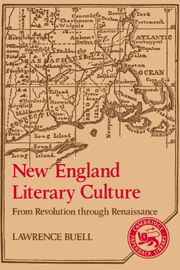Book contents
- Frontmatter
- Contents
- Acknowledgments
- Abbreviations of Frequently Cited Works
- PART I FOUR OVERVIEWS
- PART II THREE REPRESENTATIVE GENRES
- 5 New England Poetics: Emerson, Dickinson, and Others
- 6 New England Oratory from Everett to Emerson
- 7 Literary Scripturism
- PART III REINVENTING PURITANISM: THE NEW ENGLAND HISTORICAL IMAGINATION
- Part IV NEW ENGLAND AS A COUNTRY OF THE IMAGINATION: THE SPIRIT OF PLACE
- Postscript
- Appendix Vital Statistics: A Quantitative Analysis of Authorship as a Profession in New England
- Notes
- Index
6 - New England Oratory from Everett to Emerson
Published online by Cambridge University Press: 15 October 2009
- Frontmatter
- Contents
- Acknowledgments
- Abbreviations of Frequently Cited Works
- PART I FOUR OVERVIEWS
- PART II THREE REPRESENTATIVE GENRES
- 5 New England Poetics: Emerson, Dickinson, and Others
- 6 New England Oratory from Everett to Emerson
- 7 Literary Scripturism
- PART III REINVENTING PURITANISM: THE NEW ENGLAND HISTORICAL IMAGINATION
- Part IV NEW ENGLAND AS A COUNTRY OF THE IMAGINATION: THE SPIRIT OF PLACE
- Postscript
- Appendix Vital Statistics: A Quantitative Analysis of Authorship as a Profession in New England
- Notes
- Index
Summary
[The] orations of Webster and Everett are destined to become the classics of all posterity, and receive like veneration.
James Spear Loring, The Hundred Boston Orators (1852)What is called eloquence in the forum is commonly found to be rhetoric in the study.
Henry David Thoreau, Walden (1854)The preceding chapter described premodern New England verse as a “poetry of regulated moral statement.” The next two chapters should further help to explain why.
One reason was that the era between the Revolution and the Civil War was the self-styled “golden age of American oratory.” The prestige of oratory overshadowed that of poetry, not to mention fiction and drama, and resulted in the persistence, well into the Romantic period, of the Neoclassical tendency to define belles lettres as a branch of rhetoric.
Oratory, as F. O. Matthiessen observes, was the “one branch of literature in which America … had a formed tradition” by the turn of the nineteenth century. The early national sense of literary inferiority did not extend to the area of public speaking. Samuel L. Knapp, in the first extended survey of American literary culture (1829), boasted that in a half century the nation had generated more “distinguished orators and rhetoricians” than Athens had produced in a thousand years. Even more sober witnesses generally agreed that whatever the state of American literature might be, American oratory was something to brag about.
- Type
- Chapter
- Information
- New England Literary CultureFrom Revolution through Renaissance, pp. 137 - 165Publisher: Cambridge University PressPrint publication year: 1986



